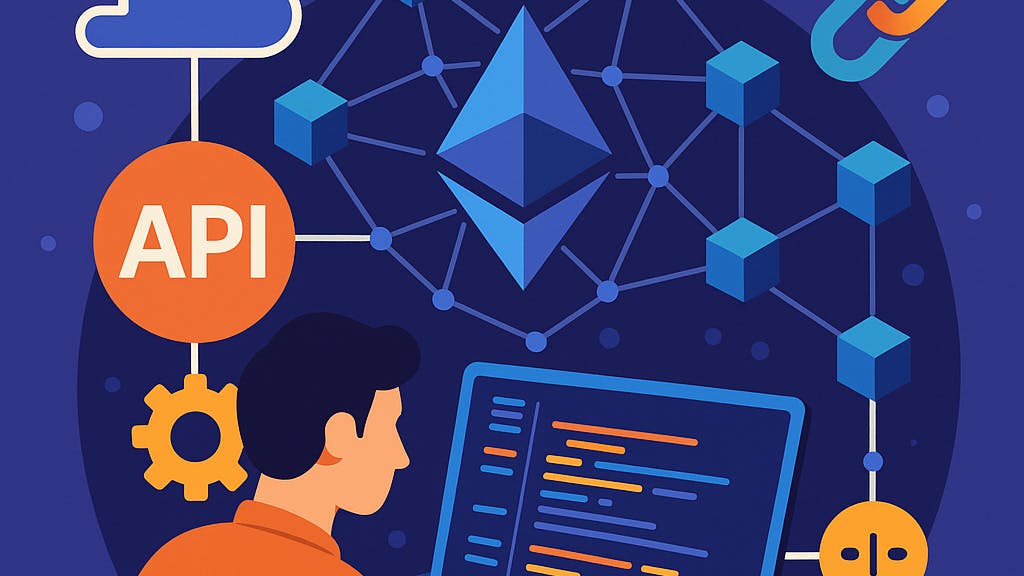A blockchain API is a service interface that lets developers interact with blockchain networks (e.g. Ethereum) without running their own full nodes. Instead of syncing and maintaining heavy node infrastructure, you simply make HTTPS or WebSocket calls to the provider’s API endpoints. This abstraction greatly simplifies dApp development. APIs handle the underlying RPC calls to query balances, read smart contracts, and broadcast transactions, so developers can focus on building features rather than infrastructure.
Using a third‑party API provider instead of self‑hosting a node has clear benefits. Running an Ethereum node requires dedicated hardware (storage, RAM, bandwidth) and constant maintenance (updates, resyncs, backups). It also ties up engineering resources in infrastructure work. In contrast, an API provider manages uptime, scaling, and software updates for you. This means faster time-to-market and more reliable service; for example, small startups and dApps often find running a personal node “not an option” due to the expertise and expense needed. Providers also often spread traffic across many nodes and regions to ensure low latency and high availability.
[!TIP] Leverage APIs to save time and cost. Using a blockchain API abstracts away node syncing and maintenance, letting you focus on the dApp. Providers typically offer generous free tiers to start development and handle scaling automatically.
Key Features of a Good Blockchain API
A quality blockchain API should offer the following features to ensure your dApp is fast, reliable, and cost-effective:
-
High Performance and Low Latency: The provider should run a globally distributed network of nodes or endpoints, so API calls are routed to the nearest data center. This reduces round-trip time. For example, QuickNode reports that distributing nodes worldwide dropped response times from ~600 ms to ~100 ms. Look for providers that offer high requests-per-second (RPS) capacity and auto-scaling clusters, so your dApp remains responsive even under heavy load.
-
Reliability and Uptime: A dependable API should have redundancy (multiple nodes) and actively monitor node health. If a node goes out-of-sync or fails, it is automatically replaced to avoid downtime. QuickNode, for instance, monitors and removes unhealthy nodes and advertises 99.99% uptime for its RPC service. In practice, choose APIs that publish SLAs or uptime stats and use multiple node clients (e.g. Geth, Erigon) under the hood to reduce single points of failure.
-
Scalability: The service must scale seamlessly as your user base grows. Good APIs auto-scale to handle traffic spikes and let you upgrade plans or add requests on-the-fly. For example, QuickNode’s infrastructure auto-scales clusters for compute-heavy calls, guaranteeing “consistent performance at any scale”. Similarly, Alchemy supports hundreds of RPS on paid plans. Scalability also means predictable pricing – pay-per-use or tiered plans so you only pay for what you need.
-
Cost-Efficiency: Compare providers’ free tiers and pricing models. A rich free tier can accelerate development: for instance, Alchemy’s free plan grants 100 million compute units/month (comparable to ~calls). Infura’s free tier allows 6 million credits/day (about 6M calls). Moralis’ Starter plan offers 40,000 compute units/day. Also check the cost of paid tiers: e.g. QuickNode’s $49 plan includes 80M calls. Ensure the pricing scales with usage (e.g. pay-as-you-go) so you can grow without huge surprise bills.
-
Multi-Chain Support: Even if you’re focused on Ethereum, multi-chain support can be valuable for dApps that bridge networks or expand to other EVM chains (Polygon, BSC, Avalanche, etc.). Major providers support dozens of networks: Alchemy covers ~37 chains, QuickNode ~66 networks, Moralis 24 chains, Ankr ~75 chains (EVM and non-EVM), and GetBlock 50+ protocols. A multi-chain API can future-proof your app for cross-chain features.
-
Developer Tools and Experience: Look for extra features that speed up development. Good APIs offer SDKs (JavaScript, Python, etc.), dashboards or analytics to track usage, and tools like transaction simulators, event streamers, or webhooks. For instance, Alchemy provides enhanced APIs (NFT API, Transfers API, Debug API) and dashboards, while Moralis bundles specialized Web3 endpoints (Wallet API, NFT API, Token API). Robust documentation and responsive support (e.g. 24/7 or community Slack) also make development smoother.
[!INFO] Node vs. API trade-off: Running your own node can maximize decentralization and privacy, but it introduces maintenance overhead, scaling challenges, and potential downtimes. A hosted API offloads these concerns: you gain reliable, up-to-date infrastructure (often with SLAs), at the expense of trusting the provider. Choose the level of decentralization vs. convenience that fits your project’s needs.
Comparing Popular Blockchain APIs
We review leading Ethereum dApp API providers and summarize their features:
-
Alchemy: A comprehensive Web3 platform known for rich developer tools and analytics. Alchemy’s free tier offers 100M compute units/month (generous quota) and 25 RPS. Paid “Pay-As-You-Go” starts at $5 for 11M CUs (≈$0.40/M CU) and up to 300 RPS. It supports ~37 networks (Ethereum mainnet and many L1/L2 chains), plus advanced APIs like NFT and Transfers. Alchemy is widely used by high-profile dApps (e.g. OpenSea) for its scalability and tooling.
-
Infura: A veteran Ethereum API (by ConsenSys), offering a stable, easy start. The Core (free) plan allows 6M credits/day and 2,000 credits/s throughput. Paid plans begin at $50/month (Developer tier) for 15M credits/day and 4,000 credits/s. Infura supports Ethereum, Polygon, Arbitrum, Optimism, and IPFS storage, among others. It’s known for uptime and backing by the Ethereum ecosystem, though its free quotas are lower than Alchemy’s.
-
QuickNode: Focused on raw speed and multi-chain support. QuickNode’s free plan includes 10M API credits/month and 15 RPS. The $49/month “Build” plan ups this to 80M credits and 50 RPS. It supports 66+ networks (Ethereum, Solana, Bitcoin, etc.). QuickNode runs global redundant clusters (auto-scaling, multi-client setups) to minimize latency. It is often chosen for high-performance apps requiring worldwide reach.
-
Moralis: A developer platform offering Web3 data APIs on many chains. The Starter (free) plan provides 40,000 CUs/day and access to “All Networks”. The $199/month “Pro” plan offers 100M CUs/month and 50 RPS. Moralis stands out with built-in high-level endpoints: Wallet API, NFT API, Token API, Price API, and Streams for real-time updates. This can greatly accelerate NFT or token-based applications. Moralis supports 24 chains (primarily EVM). It’s popular for apps needing quick Web3 feature integration rather than raw node management.
-
Ankr: A decentralized infrastructure network with RPC services. Ankr’s Freemium tier (always free) allows 30 RPS for node RPC calls. The Premium (pay-as-you-go) tier starts at ~$10 for 100M credits, scaling up to 1500 RPS. It supports 75+ chains and offers both HTTPS and WebSocket endpoints. Since Ankr leverages a distributed node pool, it appeals to projects needing many chains or preferring a more decentralized node backend.
-
GetBlock: A cost-effective RPC provider covering many chains. GetBlock’s free shared node plan grants 40K requests per day (up to 60 RPS). Its entry-level paid plan is $29/mo (then $499/mo) offering 5M requests/month at 200 RPS. At higher tiers ($499/mo), it provides unlimited requests at 300 RPS. GetBlock supports 50+ protocols (Ethereum, BNB Smart Chain, Tron, etc.) and offers dashboards with usage stats. It positions itself as a “practical choice” balancing cost, ease of use, and reliability.
The table below summarizes key differences (quotas, throughput, features):
|
Provider |
Free Tier |
Paid Plan (Starting) |
Throughput (Free / Paid) |
Notable Features |
|---|---|---|---|---|
|
Alchemy |
100M Compute Units/mo |
$5 for 11M CU (PayGo) |
25 RPS free; 300 RPS paid |
37+ networks; advanced APIs (NFT, Transfers); strong analytics tools |
|
Infura |
6M credits/day |
$50/mo (Developer) |
2000 credits/s free; 4000 credits/s Dev |
Ethereum & major L2s (Polygon, Arbitrum); IPFS; long industry track record |
|
QuickNode |
10M credits/mo |
$49/mo (Build plan) |
15 RPS free; 50 RPS at $49 |
66+ chains; global multi-client network; supports WebSocket/streaming |
|
Moralis |
40k Compute Units/day |
$199/mo (Pro) |
(Starter has low throughput); 50 RPS on Pro |
24 chains; built-in NFT/Wallet/Token/Price APIs; streaming events |
|
Ankr |
30 RPS (node RPC) |
Paygo from ~$10 for 100M |
30 RPS free; up to 1500 RPS PayGo |
75+ chains; decentralized node network; also offers staking/oracle APIs |
|
GetBlock |
40k reqs/day |
$29 for 5M/mo (Starter) |
60 RPS free; 200 RPS at $29 |
50+ chains; 99.9% uptime & 24/7 support; dedicated node option available |
|
(Self-Hosted) |
N/A |
N/A |
Unlimited (limited by your hardware) |
Full control (client choice, no 3rd-party); requires ops (Geth/Erigon maintenance) |
Each provider has trade-offs. Alchemy and Infura excel in enterprise-grade reliability and ecosystem integration. QuickNode shines on raw speed and broad chain coverage. Moralis offers high-level APIs for NFTs and tokens. Ankr and GetBlock appeal for multi-chain reach and flexible pricing. The right choice depends on your dApp’s specific needs (see next section).
Choosing the Right API for Your dApp
Selecting the best API requires matching its strengths to your dApp’s requirements:
-
Workload and Scalability: Estimate your traffic and peak load. For a DeFi or high-traffic application that requires constant low-latency access, prioritize providers with high RPS limits and global infrastructure (e.g. QuickNode, Alchemy, Infura). If you’re a small project or PoC, free tiers (Alchemy’s 100M CU, Infura’s 6M/day, etc.) may suffice initially. Always test response times from your target user regions. Providers like QuickNode even let you benchmark endpoints interactively.
-
Specialized Features: If your dApp handles NFTs, blockchain data analytics, or indexing, specialized APIs matter. Alchemy and Moralis both offer NFT metadata endpoints and Web3-specific services. Moralis’s built‑in NFT and Wallet APIs can greatly reduce development work. For gaming or meta-universe projects, you may need not only Ethereum but also sidechains (Polygon, BSC, etc.); providers with broad multi-chain support (QuickNode, Ankr, GetBlock) are advantageous. For example, QuickNode and GetBlock support dozens of chains beyond EVM, which is useful if you plan to expand cross‑chain.
-
Cost & Pricing Flexibility: Compare the costs at your expected scale. Some providers (GetBlock, Moralis) offer very high free/low-cost quotas which is great for startups. Others (Infura, Alchemy) may cost more at scale but provide advanced features. Consider pay‑as‑you‑go versus fixed plans – Infura and QuickNode have usage-based models, whereas Alchemy’s paid plans use compute units. Don’t overlook hidden costs: e.g. Infura’s free tier has a per-second cap (2k credits/sec) which may throttle bursty traffic. Tip: Use free tiers to prototype, but monitor usage closely; hitting free limits can halt your app unexpectedly.
-
Reliability and Trust: For mission-critical dApps, you may require an SLA (service-level agreement) or enterprise support. Providers like Alchemy and Infura offer premium support and service guarantees on paid plans. If decentralization is paramount, remember that any centralized RPC can theoretically censor or block requests for certain addresses. In that case, either run your own node(s) or use a decentralized RPC network (like Pocket Network). A mix strategy is also common: use multiple providers as failover.
-
Developer Experience: Evaluate documentation, SDKs, and community. Alchemy, QuickNode, and Moralis all supply well-documented SDKs (JavaScript, Python, etc.) and dashboards. Good developer portals can dramatically speed up debugging. For example, QuickNode’s dashboard shows node health, and Alchemy provides tooling like “Alchemy Build” for debugging calls. Also consider ecosystem adoption: if many dApps already use a provider, it’s likely battle-tested.
[!TIP] Test and compare. Don’t lock into one provider immediately. During development, try several APIs to compare real-world performance. Measure request latency and error rates under load. Also review how easy it is to switch networks or get help. Factors like OAuth integration, API key management, or IP whitelisting can affect your workflow.
GetBlock Positioning: Among these options, GetBlock offers a compelling balance of value and flexibility. Its free tier and entry plan (5M calls for $29/mo) are among the most generous at low volumes. It supports over 50 chains and promises 99.9% uptime with 24/7 support. GetBlock’s advertised “balance between cost, ease of use, and reliable access” makes it suitable for projects that need multi-chain access without a large budget. For example, a multi-chain wallet or NFT service might use GetBlock for less common networks (Tron, ETC, etc.) where larger providers don’t focus, while using Alchemy/Infura for Ethereum mainnet.
Conclusion
In summary, when choosing a blockchain API for an Ethereum dApp, the key factors are performance (latency & throughput), reliability (uptime & support), cost, security, chain compatibility, and developer tools. Alchemy, Infura, QuickNode, Moralis, Ankr, and GetBlock each offer different trade-offs: free quotas, pricing, and special features. Your ideal choice depends on your dApp type (DeFi, NFT, gaming, etc.) and scale. For example, DeFi apps generally demand high throughput and low latency (favoring QuickNode or Alchemy), while NFT apps may benefit from NFT-specific endpoints (Alchemy, Moralis).
As the Web3 ecosystem grows, we expect the RPC provider landscape to evolve. The market for blockchain APIs is expanding rapidly (projected ~18% CAGR through 2035). Providers will likely offer even more specialized and robust services. We may see increased focus on decentralized or multi-provider setups to avoid single points of failure, deeper integrations with indexing and analytics tools, and features tailored to emerging use cases. Choosing a scalable, secure, and well-supported API provider will be essential to meeting future dApp demands.










